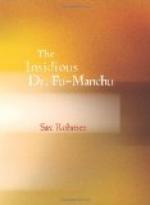“What then?” asked Smith.
“She was afraid to move—afraid to look from the window!”
My friend turned and stared hard at me.
“A subjective hallucination, Petrie?”
“In all probability,” I replied. “You should arrange that your wife be relieved in her trying duties, Mr. Weymouth. It is too great a strain for an inexperienced nurse.”
CHAPTER XXVIII
Of all that we had hoped for in our pursuit of Fu-Manchu how little had we accomplished. Excepting Karamaneh and her brother (who were victims and not creatures of the Chinese doctor’s) not one of the formidable group had fallen alive into our hands. Dreadful crimes had marked Fu-Manchu’s passage through the land. Not one-half of the truth (and nothing of the later developments) had been made public. Nayland Smith’s authority was sufficient to control the press.
In the absence of such a veto a veritable panic must have seized upon the entire country; for a monster—a thing more than humanly evil— existed in our midst.
Always Fu-Manchu’s secret activities had centered about the great waterway. There was much of poetic justice in his end; for the Thames had claimed him, who so long had used the stream as a highway for the passage to and fro for his secret forces. Gone now were the yellow men who had been the instruments of his evil will; gone was the giant intellect which had controlled the complex murder machine. Karamaneh, whose beauty he had used as a lure, at last was free, and no more with her smile would tempt men to death— that her brother might live.
Many there are, I doubt not, who will regard the Eastern girl with horror. I ask their forgiveness in that I regarded her quite differently. No man having seen her could have condemned her unheard. Many, having looked into her lovely eyes, had they found there what I found, must have forgiven her almost any crime.
That she valued human life but little was no matter for wonder. Her nationality—her history—furnished adequate excuse for an attitude not condonable in a European equally cultured.
But indeed let me confess that hers was a nature incomprehensible to me in some respects. The soul of Karamaneh was a closed book to my short-sighted Western eyes. But the body of Karamaneh was exquisite; her beauty of a kind that was a key to the most extravagant rhapsodies of Eastern poets. Her eyes held a challenge wholly Oriental in its appeal; her lips, even in repose, were a taunt. And, herein, East is West and West is East.
Finally, despite her lurid history, despite the scornful self-possession of which I knew her capable, she was an unprotected girl— in years, I believe, a mere child—whom Fate had cast in my way. At her request, we had booked passages for her brother and herself to Egypt. The boat sailed in three days. But Karamaneh’s beautiful eyes were sad; often I detected tears on the black lashes. Shall I endeavor to describe my own tumultuous, conflicting emotions? It would be useless, since I know it to be impossible. For in those dark eyes burned a fire I might not see; those silken lashes veiled a message I dared not read.




